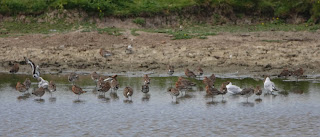Thursday 16 July
A rather overcast and cool morning as we thee headed off along the M27 to spend three hours at
Farlington Marshes at the north of Langstone Harbour between Portsmouth and Hayling Island. Not the warmest of starts upon arriving to coincide with the outgoing tide and over an hour before the sun broke through, but by the time we departed for home just a few broken clouds in the brilliant blue sky and the temperature up into the low twenties.
 |
| Farlington Marsh looking eastwards |
Setting off in an anti clockwise walk along the harbour wall we were soon seeing numerous
Black-headed Gulls and at least five
Crows. A handful of
Goldfinch were feeding in the bushes to our left and the the first distant sight of an
Oystercatcher at water line. A couple of
Herring Gulls put in an appearance and then a long stop at the extensive reedbed to both check the inlets and river at the back. Near at hand calling
Reed Warblers with a brief sighting and overhead a couple of
Common Swift moving with the passing gulls. To the back a very large flock of feeding and swirling
Starlings, well in excess of 200. On the river itself a
Mute Swan with five cygnets along with a score of
Canada Geese, a few
Coots and the first sight of the
Black-tailed Godwit flock, totalling about an hundred.
 |
| The large flock of Black-tailed Godwits Limosa limosa |
On the field nearer to us a couple of
Magpies plus a
Moorhen that wandered off the water and then we picked up out third
Little Egret of the morning. We could also see a sunbathing
Cormorant and a dozen
Mallard plus a couple of
Shelduck. In the small inlet in front of us we noticed a juvenile
Great Crested Grebe but no sign of an adult.
 |
| Juvenile Shelduck Tadorna tadorna |
Lots of pleasure as we watched a
Meadow Pipit with a beak full of food that refused to leave its bush-top post until it actually appeared on the path in front of us getting closer and closer. Also in the neighbourhood a rather handsome male
Linnet.
 |
| Meadow Pipit Anthus pratensis |
With the water rapidly receding to expose the mud flats more and more waders were recorded as they came to feed. Many, many
Redshank but also a few
Greenshank and a small party of
Dunlin. Lovely to find a trio of distant
Curlew and then, reaching a bramble patch at the far end of the site a lovely
Willow Warbler plus a female
Blackbird working the field edges.
 |
| Dunlin Calidris alpina |
Continuing on round to the far side more and more
Little Egrets, a few more
Redshank and at least a score of
Oystercatchers. Not just the occasional
Linnet and a passing
Pied Wagtail but another
Meadow Pipit came to forage on the path in front of us. Then our attention was drawn to the movement in the bushes on the inland side of the sea wall and eventually patience was rewarded with the sight of a
Common Whitethroat.
 |
| A very busy Meadow Pipit Anthus pratensis |
A small pool on the inland side held a number of nesting platforms, three of which were occupied by
Black-headed Gulls and the furthermost two by
Common Terns. On the water itself a pair of moulting
Shelduck and three youngsters plus a couple of
Dunlin and maybe a score of
Black-tailed Godwits plus, of course, yet another
Little Egret. Overhead we had a pair of passing
Barn Swallows and, once more, the calling
Reed Warblers.
 |
| Common Tern Sterna hirundo with Shelduck and Black-tailed Godwit in background |
Working our way to the Information Centre at the Barn we had more
Wood Pigeons and
Linnets plus another
Common Swift before the sight of a
Chiffchaff in a tall hedge to our right. Once at the viewpoint overlooking the river we could see plentiful supply of
Mallards,
Coot,
Little Egret and
Canada Goose along with a single
Mute Swan. A couple of
Moorhen appeared at the back in front of the reeds where we then duly noted the feeding
Little Grebe. First a
Sky Lark and then a handful of
Common Swifts were overhead as we took the final part of the circuit back to the car following the river. Approaching the birds seen from the viewpoint we noted that there was also another small lock of
Black-tailed Godwits plus more than a handful of
Little Egrets. However, using the scope to confirm what I thought I had noticed with the bins, I was also able to observe the single
Cattle Egret - and in what appeared to be breeding (summer) plumage. Possibly a special sighting for the site area or even county and what a last bird to see on a most enjoyable morning.
 |
| Record shot of the distant Cattle Egret Bubulcus ibis |
Birds seen:
Canada Goose, Mute Swan, Shelduck, Mallard, Little Grebe, Great Crested Grebe, Cormorant, Cattle Egret, Little Egret, Moorhen, Coot, Oystercatcher, Dunlin, Curlew, Black-tailed Godwit, Greenshank, Redshank, Black-headed Gull, Herring Gull, Common Tern, Wood Pigeon, Common Swift, Sky Lark, Barn Swallow, Meadow Pipit, Pied Wagtail, Blackbird, Reed Warbler, Whitethroat, Willow Warbler, Chiffchaff, Magpie, Carrion Crow, Starling, Goldfinch, Linnet.
 |
| Oystercatcher Haematopus ostralegus |
 |
| More Black-tailed Godwits Limosa limosa |
 |
| Very distant Curlew Numenius arquata |
 |
| Little Egrets Egreta garzeta |
Check out the accompanying website at http://www.birdingaxarquia.weebly.com for the latest sightings, photographs and additional information













No comments:
Post a Comment